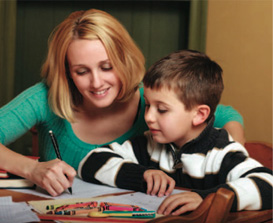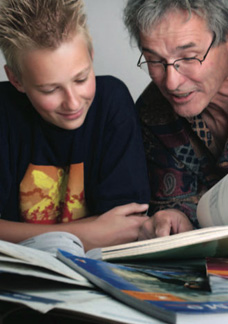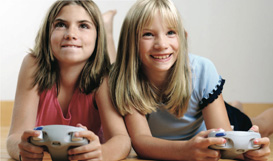EDUCATION INSIGHT: Finding the Balance
Gaining Perspective on Your Child's Academic Pursuits
by Wendy Dunham
Today’s society and culture have altered family life, many say tipping it out of balance. Parents and teachers put pressure on kids to achieve academically. More children are being enrolled in organized sports and extracurricular activities at times when, traditionally, they would have been enjoying unstructured down time, play time, and family time. When these after-school activities and the ever-increasing amounts of homework are done, what time is left for relaxation?
 On top of this, moving into a new school and a new community can bring additional stress. Students might feel added pressure to get up to speed and perform well academically in a new class. Parents might over-do it when they urge their children to take part in extracurricular activities in hopes of helping them make new friends.
On top of this, moving into a new school and a new community can bring additional stress. Students might feel added pressure to get up to speed and perform well academically in a new class. Parents might over-do it when they urge their children to take part in extracurricular activities in hopes of helping them make new friends.
It’s not that sports, extracurricular activities and homework are bad for kids; in fact they need and benefit from them, but in moderation. While you’re in the process of making education choices for your children, don’t forget to
factor extracurricular activities, homework and unstructured time into your decisions. Striking that balance is becoming harder for parents, and it’s a fine line to walk as you choose a school.
Gina Kantor, a second grade teacher at Garrison Mill elementary in Marietta, thinks kids are on a treadmill. “Down time is crucial for creative expression. It provides the opportunity for imaginative play,” she says. “We want to foster children who will mature into adults who can think outside of the box. Down time also gives a child an opportunity to relax and regroup, giving him or her a better chance of being centered. This reduces impulsive behavior and increases the likelihood of a child responding rather than reacting to a situation. It is so much harder today to raise well-rounded, centered, fit, pre- pared, and creative young people.”
 “Children need unplanned time to practice exercising choice, renewing their senses, and for simply being,” adds Jay Underwood, Head of School for High Meadows School in Roswell. “When our hearts beat there is space in between; when we breathe our lungs expand and contract. Life has a rhythm all its own that includes ample recovery along with activity.”
“Children need unplanned time to practice exercising choice, renewing their senses, and for simply being,” adds Jay Underwood, Head of School for High Meadows School in Roswell. “When our hearts beat there is space in between; when we breathe our lungs expand and contract. Life has a rhythm all its own that includes ample recovery along with activity.”
If children aren’t given time to relax and regroup, what is the outcome? “When children are on the go the whole time they don’t know how to stop and think even for just 10 minutes. Without a technological crutch, they don’t know what to do with themselves,” says Garrison Mill school counselor Jennifer Ofiara. “Schools can do their part by limiting what is expected of them after school, but parents should not let family time be all about their kids’ sports or activities.”
Too many organized activities and not enough unstructured ones hurt processing skills, adds Mike Cook, 2010 Teacher of the Year at Sixes Elementary in Canton. “Children need time to sit and think so they can process all they have been exposed to,” he says. “They need to get to bed early, too. Parents who both work often let kids go to bed late so they can spend time with them. Then they come to school the next day tired.”
At the same time, Cobb County School System prevention specialist and consultant Jeff Dess knows how valuable sports and extracurricular activities are for young people. “They give them a chance to socialize, learn how to play, and learn how to work as a team,” he says. “Some kids struggle educationally but can do well in a different field. They need to be given the opportunity to feel good about themselves and feel success.”
 Kids with poor social skills also benefit from the team-building spirit of sports, according to Ofiara, who adds that nonathletic children can shine in other areas such as music and the arts. Furthermore, Kantor says that sports teach kids to cooperate for the greater good, get exercise, and think on their feet.
Kids with poor social skills also benefit from the team-building spirit of sports, according to Ofiara, who adds that nonathletic children can shine in other areas such as music and the arts. Furthermore, Kantor says that sports teach kids to cooperate for the greater good, get exercise, and think on their feet.
Sports are necessary for the full development of children, but homework is more controversial. Ofiara agrees with research findings that recommend the ideal amount corresponds to 10 minutes per grade level. First graders do 10 minutes per night, second graders do 20 minutes, and so on.
“Short periods of meaningful homework are very beneficial,” says Cook. “If a child is struggling on a particular subject, extra work on that topic can only help. But it should not last for several hours a night nor interfere with family time.”
“Homework topics should be connected to what the child is doing in class to make it beneficial,” adds Dess. “Right now I believe young people are getting too much homework.”
Achieving balance takes effort. Ofiara says parents should observe what is going on, read cues from their children, and make changes if necessary. “Are you stressed out from driving your kids all over? Are your kids crying because they have too much homework? Are they having tantrums?” she asks. “If family life is stressful then you must change it by slowing down the pace.”
 Ultimately, parents must be the ones to make wise choices for their children. “Parents must reject the notion that children must act, play, compete and perform in multiple areas to ‘keep up,’” warns Jerri King, head of School at First Montessori School of Atlanta. “Research, trends observed by family therapists, and the common practices in college acceptance do not support the perceived benefits of over-involvement. While children may have the tendency to over-commit, balance is sustained when adults provide the necessary limits and expectations regarding school work and extra- curricular activities.”
Ultimately, parents must be the ones to make wise choices for their children. “Parents must reject the notion that children must act, play, compete and perform in multiple areas to ‘keep up,’” warns Jerri King, head of School at First Montessori School of Atlanta. “Research, trends observed by family therapists, and the common practices in college acceptance do not support the perceived benefits of over-involvement. While children may have the tendency to over-commit, balance is sustained when adults provide the necessary limits and expectations regarding school work and extra- curricular activities.”
Today, Dess sees more young people stressed out and anxious than ever before. “Parents can help by identifying and recognizing their child’s gifts, no matter what they are. They should ex- pose them to new opportunities, but listen to who they are and not push them into something they don’t enjoy. If we balance emotional and social well-being with academic performance, then academic performance will benefit.”







